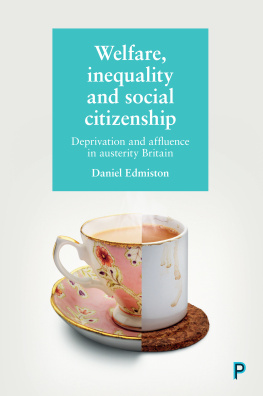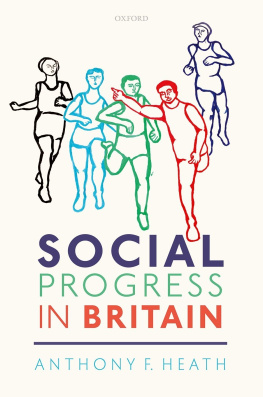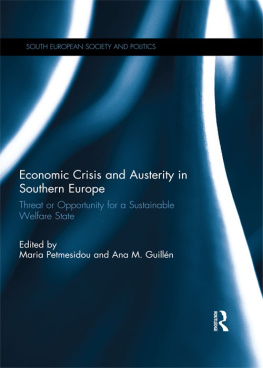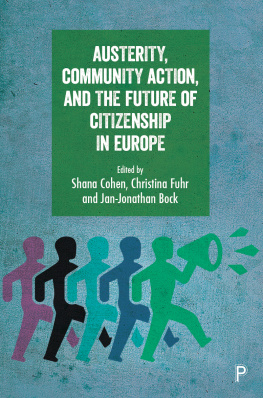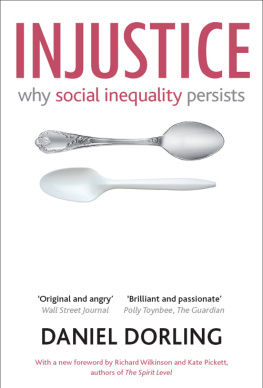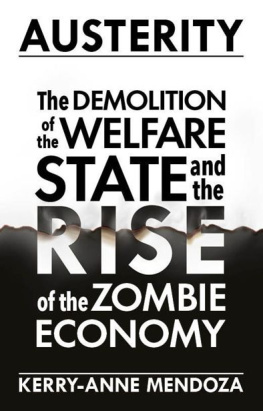
First published in Great Britain in 2018 by
Policy Press University of Bristol 1-9 Old Park Hill Bristol BS2 8BB UK Tel +44 (0)117 954 5940 e-mail
North American office: Policy Press c/o The University of Chicago Press 1427 East 60th Street Chicago, IL 60637, USA t: +1 773 702 7700 f: +1 773-702-9756 e:
Policy Press 2018
British Library Cataloguing in Publication Data
A catalogue record for this book is available from the British Library
Library of Congress Cataloging-in-Publication Data
A catalog record for this book has been requested
ISBN 978-1-4473-3746-1 hardcover
ISBN 978-1-4473-3748-5 ePub
ISBN 978-1-4473-3749-2 Mobi
ISBN 978-1-4473-3747-8 epdf
The right of Daniel Edmiston to be identified as author of this work has been asserted by him in accordance with the Copyright, Designs and Patents Act 1988.
All rights reserved: no part of this publication may be reproduced, stored in a retrieval system, or transmitted in any form or by any means, electronic, mechanical, photocopying, recording, or otherwise without the prior permission of Policy Press.
The statements and opinions contained within this publication are solely those of the author and not of the University of Bristol or Policy Press. The University of Bristol and Policy Press disclaim responsibility for any injury to persons or property resulting from any material published in this publication.
Policy Press works to counter discrimination on grounds of gender, race, disability, age and sexuality.
Cover design by Hayes Design
Front cover image: Getty
Readers Guide
This book has been optimised for PDA.
Tables may have been presented to accommodate this devices limitations.
Image presentation is limited by this devices limitations.
Contents
My thanks to all those who agreed to be interviewed for this book. Without your time and generosity, it would not have been possible to undertake this study. Our conversations have disturbed and motivated me in equal measure. I hope I have done, and continue to do, dispassionate justice to your experiences.
I would like to thank the School of Sociology and Social Policy at the University of Leeds for the opportunities it has afforded me. I am grateful to Simon Prideaux for his advice and guidance and to Nick Ellison for his endless support and kindness. Special thanks are also due to Tracy Shildrick and Peter Dwyer, without whom this book would not have been possible or published!
There are so many colleagues and friends within the Social Policy community that have (sometimes unintentionally!) inspired and helped me to pursue this research. The Social Policy community is a unique and special one a community that I am proud and thankful to call my disciplinary home. I am also grateful to all of the team at Policy Press for their patience and help.
Thanks to my family and friends for reminding me of the importance of hard work but more importantly good fortune. Finally, I would like to thank Ryan Doran for being by my side throughout.
Introduction
On 13 July 2016, Theresa May delivered her maiden speech as Prime Minister, outlining her commitment to a union between all of our citizens, every one of us, whoever we are and wherever were from. She declared that her government would continue to work in the spirit of her predecessor to make Britain a country that works not for a privilege few, but for every one of us (May, 2016a). Such a statement typifies an ongoing discord between the political rhetoric and policy reality of regressive welfare reform and fiscal recalibration undertaken in the United Kingdom (UK). Since 2010, successive measures contributing towards the individualisation and liberalisation of welfare have shaped social inequality in new and patterned ways. Against this backdrop, this book considers the lived realities of relative deprivation and affluence that presently characterise embedded welfare austerity in the UK.
To do so, the book draws on a study of poverty and prosperity to explore the increasingly variegated status and praxis of social citizenship unfolding in the UK today. Through the voices of citizens experiencing poverty and those who are rich, the book critically examines the prevailing functions of welfare and what they reveal about the changing nature of social citizenship as a top-down status and as a bottom-up practice. The experiences, attitudes and practices of citizens are particularly important if we are to fully understand the existing citizenship configuration and its relation to welfare politics and inequality. As such, the book considers how those marginalised and validated by the prevailing welfare settlement negotiate and engage with the institutions and ideals that have come to structure their relative (dis) advantage. In particular, attention is paid to their respective political subjectivities and engagements to explore and explain the relations between welfare, inequality and citizenship.
Beyond this, by exploring the experiences, attitudes and engagements of the rich alongside the poor, the book problematises dominant policy thinking about the finite nature of public resources and their distribution. This is especially important in light of the austerity consensus and anti-welfare commonsense that has emerged in recent years (Farnsworth and Irving, 2012; Jensen and Tyler, 2015). Studying material deficits alongside capital accumulation stimulates critical consideration of the distributional role of social citizenship and challenges ideas surrounding the functions and limits of welfare. Deprivation and wealth can be seen as fundamentally relational and mutually constitutive. Capital accumulation is only possible through a capital deficit created elsewhere. Similarly, relative deprivation is only created through the transference or maintenance of relative affluence. As such, neither material condition can be fully understood in isolation from the other, nor exclusively frame the institutions and practices of citizenship that give rise to it. On this basis, the book examines the particular ways in which social citizenship is implicated in the production and persistence of inequalities of status, resource, outcome and opportunity in contemporary Britain.
Welfare austerity: perjury, punishment and destitution
In 2010, the ConservativeLiberal Democrat coalition government inherited a relatively high level of public sector debt in the UK. The two primary drivers of a growing public sector deficit were the costs associated with financial sector support and revenue losses through reduced outputs (Chote et al, 2010; Edmiston, 2014a). In spite of this, the coalition government repeatedly cited poor fiscal discipline and permissive welfare as the key cause of the budget deficit and a significant barrier to the UKs economic recovery (Clarke and Newman, 2012). On this basis, the coalition government cultivated a political and policy mandate for public service and welfare reforms alongside cuts to working-age public social expenditure. Since then, a substantial restructuring of the UK welfare state has taken place, which has been driven by one of the largest austerity packages implemented across Europe and the countries of the Organisation for Economic Co-operation and Development (OECD) since the Great Recession (Taylor-Gooby, 2012; Reeves et al, 2013; OECD, 2014). Throughout its term in office, the coalition government committed to modifying what it saw as a complex and chaotic system, which failed to promote work and penalised responsible choices all at a great cost to hard-working taxpayers (Duncan Smith, 2015: no page). This distinction between ostensive beneficiaries of and contributors to the welfare system has framed the austerity agenda and underpinned a range of rhetorical and administrative devices to delineate and produce good citizen workers through increasingly ubiquitous welfare conditionality (Dwyer and Wright, 2014; Hills, 2017).


